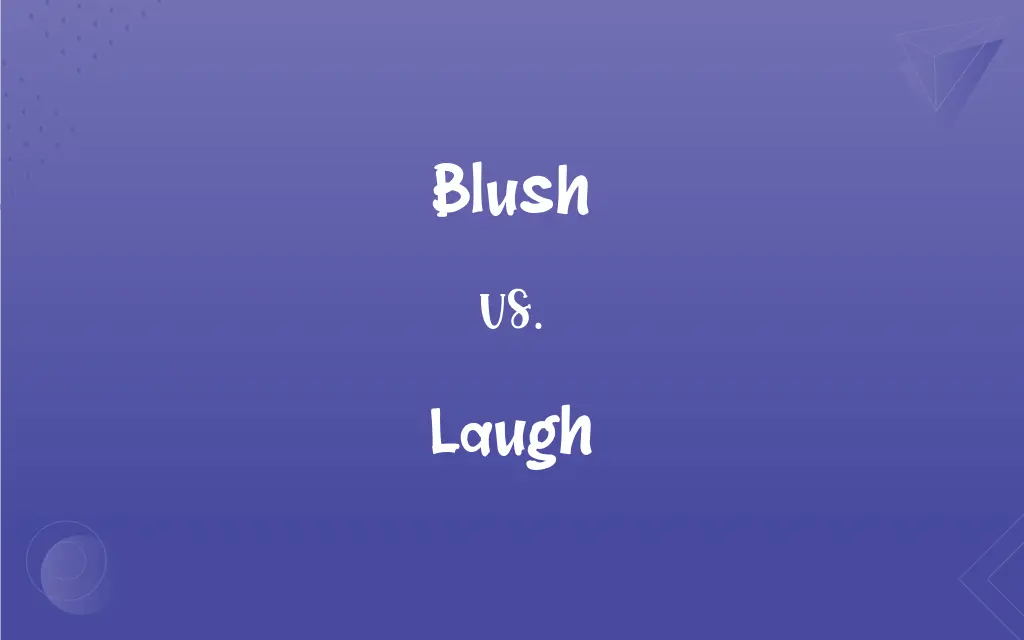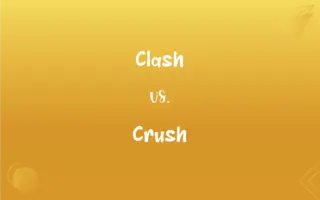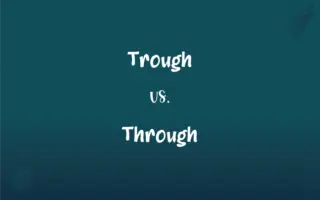Blush vs. Laugh: What's the Difference?
Edited by Aimie Carlson || By Janet White || Updated on October 7, 2023
Blush is a reddening of the face due to emotions, while laugh is a vocal expression of amusement or happiness.

Key Differences
Blush and laugh are expressions of human emotions but convey different feelings and reactions. A blush is the involuntary reddening of the face, typically due to embarrassment, shyness, or modesty. It is a visual manifestation of internal feelings and emotions and can occur when one is feeling self-conscious or caught off guard. Blushing can be subtle or noticeable, varying from person to person, and it is a universal sign of being emotionally moved.
On the other hand, a laugh is a vocal expression of amusement, joy, or happiness. It is a sound emanating from the throat, coupled with characteristic facial movements and is often contagious. Laughter is a universal language, understood by people of all cultures and languages. It occurs when something is found amusing or funny, and it can be loud or quiet, long or short, depending on the individual and the situation. It is also known to have several health benefits, including stress relief and the enhancement of mood.
Blush and laugh serve as indicators of human emotions, but they arise due to different circumstances. A blush is usually associated with feelings of awkwardness or embarrassment and is an involuntary physiological response. It is often accompanied by a feeling of warmth in the face and is generally not associated with any sound. The reddening of the face that characterizes a blush is due to the dilation of blood vessels under the skin.
In contrast, laughter is a conscious or reflexive vocal reaction to amusement or joy. It is an audible expression, reflecting a sense of humor or happiness. The sound of laughter can vary greatly, and it can be shared among individuals, creating a communal experience. While blushing is a silent, visual cue, laughing is an audible, shared experience, often spreading joy and amusement to others.
In essence, while both blush and laugh are reflections of our emotional states, they differ significantly in their expression, causes, and impacts. Blushing is a silent, visual display of emotions like embarrassment, while laughter is a vocal, audible indication of amusement or happiness.
ADVERTISEMENT
Comparison Chart
Definition
Reddening of the face due to emotions.
A vocal expression of amusement or happiness.
Nature
Visual and Silent.
Audible and Vocal.
Cause
Embarrassment, shyness, or modesty.
Amusement, joy, or happiness.
Universality
Universal sign of emotional response.
Universal expression understood by all cultures.
Physical Manifestation
In the face, due to dilation of blood vessels.
Involves facial movements and sound from the throat.
ADVERTISEMENT
Blush and Laugh Definitions
Blush
A sign of feeling self-conscious or modest.
His unexpected praise made her blush.
Laugh
An audible reaction to something funny.
Her laugh was so contagious that soon everyone was laughing.
Blush
A silent expression of being emotionally moved.
A blush of shame was evident on his face.
Laugh
A reflection of joy or happiness.
His hearty laugh filled the room with joy.
Blush
To become red in the face, especially from modesty, embarrassment, or shame; flush.
Laugh
A sound produced by a joyful or amused state.
Her bubbly laugh made the baby giggle.
Blush
To become red or rosy.
Laugh
A vocal sound expressing amusement.
His joke made the whole room burst into laugh.
Blush
To feel embarrassed or ashamed
Blushed at his own audacity.
Laugh
A manifestation of a sense of humor.
The ridiculous situation caused them to erupt in a spontaneous laugh.
Blush
A reddening of the face, especially from modesty, embarrassment, or shame.
Laugh
To express certain emotions, especially mirth or delight, by a series of spontaneous, usually unarticulated sounds often accompanied by corresponding facial and bodily movements.
Blush
A red or rosy color
The blush of dawn.
Laugh
To show or feel amusement or good humor
An experience we would laugh about later on.
Blush
A glance, look, or view
Thought the painting genuine at first blush.
Laugh
To feel or express derision or contempt; mock
I had to laugh when I saw who my opponent was.
Blush
Makeup used on the face and especially on the cheekbones to give a usually rosy tint. Also called blusher.
Laugh
To feel a triumphant or exultant sense of well-being
You won't be laughing when the truth comes out.
Blush
An act of blushing; a red glow on the face caused by shame, modesty, etc.
Laugh
To produce sounds resembling laughter
Parrots laughing and chattering in the trees.
Blush
A glow; a flush of colour, especially pink or red.
Laugh
To affect or influence by laughter
Laughed the speaker off the stage.
Laughed the proposal down.
Blush
(figuratively) Feeling or appearance of optimism.
Laugh
To say with a laugh
He laughed his delight at the victory.
Blush
A sort of makeup, frequently a powder, used to redden the cheeks.
Laugh
The act of laughing.
Blush
A color between pink and cream.
Laugh
The sound of laughing; laughter.
Blush
A pale pink wine made by removing the dark grape skins at the required point during fermentation.
Laugh
(Informal) Something amusing, absurd, or contemptible; a joke
The solution they recommended was a laugh.
Blush
The collective noun for a group of boys.
A blush of boys.
Laugh
Often laughs(Informal) Fun; amusement
Went along just for laughs.
Blush
(intransitive) To become red in the face (and sometimes experience an associated feeling of warmth), especially due to shyness, shame, excitement, or embarrassment.
The love scene made him blush to the roots of his hair / to the tips of his ears.
He wasn't used to this much attention, so he blushed as he saw dozens of pairs of eyes watching him.
Laugh
An expression of mirth particular to the human species; the sound heard in laughing; laughter.
His deep laughs boomed through the room.
Blush
To be ashamed or embarrassed (to do something).
Laugh
Something that provokes mirth or scorn.
Your new hat's an absolute laugh, dude.
Blush
(intransitive) To become red.
Laugh
A fun person.
Blush
(transitive) To suffuse with a blush; to redden; to make rosy.
Laugh
(intransitive) To show mirth, satisfaction, or derision, by peculiar movement of the muscles of the face, particularly of the mouth, causing a lighting up of the face and eyes, and usually accompanied by the emission of explosive or chuckling sounds from the chest and throat; to indulge in laughter.
There were many laughing children running on the school grounds.
Blush
(copulative) To change skin color in the face (to a particular shade).
When he saw it, he blushed a beet red.
I wasn't surprised, but it was embarrassing enough that I blushed a little pink.
Laugh
To be or appear cheerful, pleasant, mirthful, lively, or brilliant; to sparkle; to sport.
Blush
(transitive) To express or make known by blushing.
Looking at me with a knowing glare, she blushed her discomfort with the situation.
Laugh
To make an object of laughter or ridicule; to make fun of; to deride; to mock.
Don't laugh at my new hat, man!
Blush
(intransitive) To have a warm and delicate colour, like some roses and other flowers.
The garden was full of blossoms that blushed in myriad shades to form a beautiful carpet of color.
Laugh
(transitive) To affect or influence by means of laughter or ridicule.
Blush
To glance with the eye, cast a glance.
Laugh
(transitive) To express by, or utter with, laughter.
Blush
Of dope or varnish: to develop an undesirable white precipitate on the surface, due to being applied in humid conditions.
Laugh
To show mirth, satisfaction, or derision, by peculiar movement of the muscles of the face, particularly of the mouth, causing a lighting up of the face and eyes, and usually accompanied by the emission of explosive or chuckling sounds from the chest and throat; to indulge in laughter.
Queen Hecuba laughed that her eyes ran o'er.
He laugheth that winneth.
Blush
To become suffused with red in the cheeks, as from a sense of shame, modesty, or confusion; to become red from such cause, as the cheeks or face.
To the nuptial bowerI led her blushing like the morn.
In the presence of the shameless and unblushing, the young offender is ashamed to blush.
He would strokeThe head of modest and ingenuous worth,That blushed at its own praise.
Laugh
Fig.: To be or appear gay, cheerful, pleasant, mirthful, lively, or brilliant; to sparkle; to sport.
Then laughs the childish year, with flowerets crowned.
In Folly's cup still laughs the bubble Joy.
No wit to flatter left of all his store,No fool to laugh at, which he valued more.
Blush
To grow red; to have a red or rosy color.
The sun of heaven, methought, was loth to set,But stayed, and made the western welkin blush.
Laugh
To affect or influence by means of laughter or ridicule.
Will you laugh me asleep, for I am very heavy?
I shall laugh myself to death.
Blush
To have a warm and delicate color, as some roses and other flowers.
Full many a flower is born to blush unseen.
Laugh
To express by, or utter with, laughter; - with out.
From his deep chest laughs out a loud applause.
Blush
To suffuse with a blush; to redden; to make roseate.
To blush and beautify the cheek again.
Laugh
The sound of laughing
Blush
To express or make known by blushing.
I'll blush you thanks.
Laugh
A facial expression characteristic of a person laughing;
His face wrinkled in a silent laugh of derision
Blush
A suffusion of the cheeks or face with red, as from a sense of shame, confusion, or modesty.
The rosy blush of love.
Laugh
A humorous anecdote or remark intended to provoke laughter;
He told a very funny joke
He knows a million gags
Thanks for the laugh
He laughed unpleasantly at hisown jest
Even a schoolboy's jape is supposed to have some ascertainable point
Blush
A red or reddish color; a rosy tint.
Light's last blushes tinged the distant hills.
Laugh
Produce laughter
Blush
A rosy color (especially in the cheeks) taken as a sign of good health
Blush
Sudden reddening of the face (as from embarrassment or guilt or shame or modesty)
Blush
Turn red, as if in embarrassment or shame;
The girl blushed when a young man whistled as she walked by
Blush
Become rosy or reddish;
Her cheeks blushed in the cold winter air
Blush
A reddening of the face typically due to embarrassment.
When complimented, Mary couldn’t help but blush.
Blush
Involuntary facial reddening due to an emotional trigger.
The unexpected attention caused her to blush deeply.
Blush
A visual manifestation of internal feelings.
A blush crept up her cheeks as she nervously awaited her turn to speak.
FAQs
Can blushing be controlled?
Blushing is typically an involuntary response and is difficult to control consciously.
Can laughing be involuntary?
Yes, laughter can be both a voluntary and involuntary response to amusement or joy.
Can animals blush?
There is no conclusive evidence that animals can blush as humans do.
Is blushing a universal human response?
Yes, blushing is a universal human response, observed across different cultures.
Can blushing be a sign of attraction?
Yes, blushing can sometimes occur when someone is attracted to another person.
Can you blush without feeling embarrassed?
Yes, blushing can occur due to a range of emotions, not just embarrassment.
Is blushing always due to embarrassment?
No, blushing can occur due to various emotions like modesty, shyness, or being emotionally moved.
Can laughter be a sign of nervousness?
Yes, some people may laugh when they are nervous or uncomfortable.
Can laughter be therapeutic?
Yes, laughter has therapeutic effects, including stress reduction and mood enhancement.
Is laughter universal?
Yes, laughter is a universal human expression understood by people from all cultures.
Can laughter be silent?
Yes, some people laugh silently, characterized by movements of the body and face but no sound.
Do animals laugh?
Some animals, like rats and primates, have been observed to exhibit laughter-like behaviors.
Can laughter occur due to tickling?
Yes, tickling can induce involuntary laughter in many people.
Is the intensity of a blush the same for everyone?
No.
Is it possible to blush in the dark?
Yes, blushing is a physiological response and can occur in the dark, but it may not be visible to others.
About Author
Written by
Janet WhiteJanet White has been an esteemed writer and blogger for Difference Wiki. Holding a Master's degree in Science and Medical Journalism from the prestigious Boston University, she has consistently demonstrated her expertise and passion for her field. When she's not immersed in her work, Janet relishes her time exercising, delving into a good book, and cherishing moments with friends and family.
Edited by
Aimie CarlsonAimie Carlson, holding a master's degree in English literature, is a fervent English language enthusiast. She lends her writing talents to Difference Wiki, a prominent website that specializes in comparisons, offering readers insightful analyses that both captivate and inform.































































